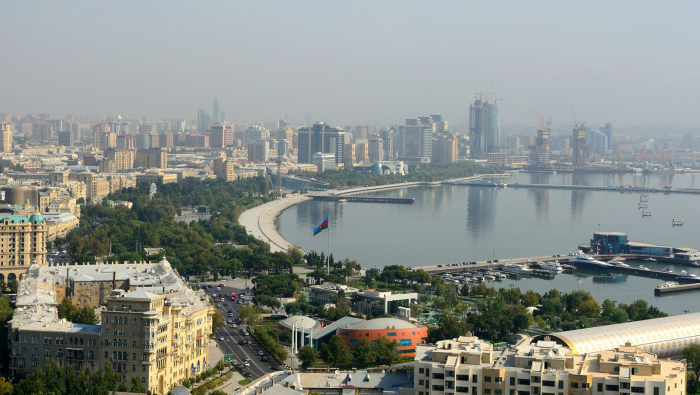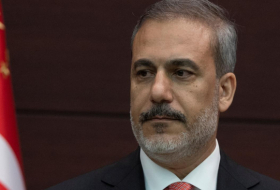Towards this end, energy resources are also a determinant factor for the economic development and social stability of the Republic of Azerbaijan. Energy revenues played a crucial role in the socio-political and economic growth of the country. Using massive revenues from crude oil and natural gas export, the country developed other sectors of the economy, and most importantly, invested energy earnings in human capital.
COVID-19 outbreak and the ongoing war between Ukraine and Russia harmed also the global energy sector. Perhaps, Azerbaijan’s economy is also based on the revenues from energy resources trade, therefore, the efficiency of allocation of energy revenues, macroeconomic development and economic stability are always high on the agenda. For instance, Azerbaijan's real GDP increased by 5.6% in 2021. Oil and gas exports as a share of total trade were around 87.78%, and the share of energy revenues in GDP was equal to 35%. Also, according to Economy Minister Mikayil Jabbarov- “as a result of the efficient use of its industrial potential, production of industrial products in the non-oil and gas industry increased by 20.8% in the first two months of 2022 compared to the same period last year”.
To date, Azerbaijan’s energy policy is aimed at modernizing the energy sector, adapting policy instruments and the regulatory framework to rapidly changing energy market. In this regard, the main aim of Azerbaijan’s energy strategy is to optimize the energy sector and provide a reliable energy supply system. It should be underlined that developments in global energy markets, mainly the future of natural gas in a decarbonizing effort of Europe, will affect Azerbaijan’s energy relations with its partners.
It is noteworthy that Azerbaijan has already started reforms in its energy system to improve the security of supply and the quality of petroleum products in the country. Now, one of the major investments is being made in the modernization and reconstruction works for the Heydar Aliyev Baku Oil Refinery, which is the main oil refinery in Baku. The refinery is processing 21 out of 24 grades of Azerbaijan crude and 15 different petroleum products, including automotive gasoline, aviation kerosene, diesel fuel, black oil, petroleum coke, and others. Growth in petroleum product demand is being driven largely by growth in the country’s construction and transportation sectors. Therefore, modernization of the refinery aims to increase the plant’s production capacity from 6 million to 7.5 million tonnes per year, as well as to meet a growing demand, produce Euro 5 quality automotive transportation fuels, add export potential, and reduce associated environmental pollution. Improvement of the quality of petroleum products is highly important from production-side and demand-side because it ensures the security of supply in the country.
One of the key elements of Azerbaijan’s energy reforms is also the development of green energy. In recent years, the country has started sustainable development in the energy sector through the creation of green energy zones and the gradual process of decarbonization. It should be underlined that renewable energy production in Azerbaijan aims to support a sustainable energy future by producing more electricity from renewable energy sources. This process will be an important target to decrease the use of natural gas in electricity production. In 2021 electricity generated from renewable energy sources made up 5.8 percent of total production. Increasing the share of renewables in power generation will also decrease greenhouse gas emissions in the country. Recently, two important renewable energy projects were signed with Saudi Arabia’s ACWA Power and United Arab Emirates' (UAE) Masdar energy companies. The 230 MW solar power plant to be built by Masdar and 240 MW Khizi-Absheron Wind Power Plant to be built by ACWA Power will support the sustainable energy future of the country. According to Minister of Energy Parviz Shahbazov “the transformation of Azerbaijan into a country of “green growth” through the extensive use of renewable energy sources over the next ten years has been defined by President Ilham Aliyev as one of the national priorities that will ensure socio-economic development. The solar power plant to be built in Baku and Absheron districts will produce about 500 million kWh of electricity annually, save 110 million cubic meters of natural gas, reduce carbon emissions by 200,000 tons, create new jobs and attract other investors to new projects “. These two projects will play an important role in increasing the share of renewable energy sources in the country’s energy system to 30 percent by 2030.
Also, Azerbaijan is actively working on plans to develop “green energy zones” in Karabakh. After the liberation of Karabakh following the 44-day war, President Ilham Aliyev declared Karabakh and East Zangezur economic regions a green energy zone. The idea is to develop the renewable energy potential of the region which will supply electricity to the “smart cities and villages” that Azerbaijan is building in its liberated territories. All the above-mentioned show that Azerbaijan targets to create the backbone of its energy supply system. This will increase the electricity export potential of the country in the future, as Azerbaijan aims to export electricity to Europe through the “Green Energy Corridor”.
Finally, the government of Azerbaijan has started the process of structural reforming the State Oil Company of Azerbaijan Republic mostly known as SOCAR. The company plays a significant role in the country’s socio-economic life and participated in all energy projects which the Azerbaijani government signed with foreign partners. On January 23, 2021, President Ilham Aliyev signed a decree “On measures for improving the management of the State Oil Company of the Republic of Azerbaijan”. According to the decree for conducting overall direction and supervision of operation of the SOCAR, to establish Supervisory Council of SOCAR. The Supervisory Board consists of seven members, including the Chairman who is appointed and dismissed by the President of the Republic of Azerbaijan. The SOCAR Supervisory Board is authorized, among others, to approve the Company’s long-term development strategy, as well as cost and revenue estimates, and monitor its implementation. It is worth also mentioning that former SOCAR’s outgoing president Rovnag Abdullayev was nominated to deputy economy minister by President Ilham Aliyev, and Rovshan Najaf was appointed as the first vice president of the company. Until the appointment of the President of SOCAR, the temporary performance of his duties is assigned to the First Vice President. President Ilham Aliyev touched upon reforms in SOCAR while addressing his speech during the international conference named “South Caucasus: Development and Co-operation”. President Ilham Aliyev emphasized that “under the new management, SOCAR will finally become a transparent international energy company.”
To sum up, Azerbaijan has started important reforms in its energy sector to meet challenges and support a sustainable energy future. Meanwhile, different analysis suggest that natural gas will play an important role in the transition period, therefore all reforms in Azerbaijan’s energy sector will increase the country’s export capacity in the future. Also, Azerbaijan can play an important role as an “energy hub” in the region by exporting Caspian energy resources to Western energy markets. In addition, by supporting renewable energy sources, Azerbaijan will balance successfully the use of natural gas and renewables in electricity production. This will create new opportunities for electricity production and export. Briefly, energy resources will continue to form Azerbaijan’s main exports, therefore, all structural and organizational reforms, as well as innovation are important for the country’s energy sector over the coming decades.
Shahmar Hajiyev is a leading specialist at the Baku-based Center of Analysis of International Relations (AIR Center).
More about:










-1734858575.jpg&h=190&w=280&zc=1&q=100)




































